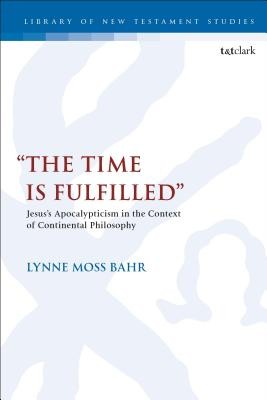
- We will send in 10–14 business days.
- Author: Lynne Moss Bahr
- Publisher: T&T Clark
- ISBN-10: 0567684342
- ISBN-13: 9780567684349
- Format: 16 x 23.9 x 1.8 cm, kieti viršeliai
- Language: English
- SAVE -10% with code: EXTRA
Reviews
Description
In this study, Lynne Moss Bahr explores the concept of temporality as central to Jesus's proclamation of the Kingdom of God. Using insights from continental philosophy on the messianic, which expose the false claim that time progresses in a linear continuum, Bahr presents these philosophical positions in critical dialogue with the sayings of Jesus regarding time and time's fulfillment. She shows how the Kingdom represents the possibilities of a disruption in time, one that reveals the intrinsic relation between God and humanity.
In illustrating how Jesus's sayings regarding time are thus expressions of his messianic identity-as of the world and not of the world--Bahr argues that the meaning of Jesus's identity as Messiah is embedded in the disjuncture of time, in the impossibility of now, from which the Kingdom comes . Bahr's use of critical theory in this study expands the concept of God's Kingdom beyond the traditional confines of the discipline.EXTRA 10 % discount with code: EXTRA
The promotion ends in 21d.17:17:59
The discount code is valid when purchasing from 10 €. Discounts do not stack.
- Author: Lynne Moss Bahr
- Publisher: T&T Clark
- ISBN-10: 0567684342
- ISBN-13: 9780567684349
- Format: 16 x 23.9 x 1.8 cm, kieti viršeliai
- Language: English English
In this study, Lynne Moss Bahr explores the concept of temporality as central to Jesus's proclamation of the Kingdom of God. Using insights from continental philosophy on the messianic, which expose the false claim that time progresses in a linear continuum, Bahr presents these philosophical positions in critical dialogue with the sayings of Jesus regarding time and time's fulfillment. She shows how the Kingdom represents the possibilities of a disruption in time, one that reveals the intrinsic relation between God and humanity.
In illustrating how Jesus's sayings regarding time are thus expressions of his messianic identity-as of the world and not of the world--Bahr argues that the meaning of Jesus's identity as Messiah is embedded in the disjuncture of time, in the impossibility of now, from which the Kingdom comes . Bahr's use of critical theory in this study expands the concept of God's Kingdom beyond the traditional confines of the discipline.

Reviews